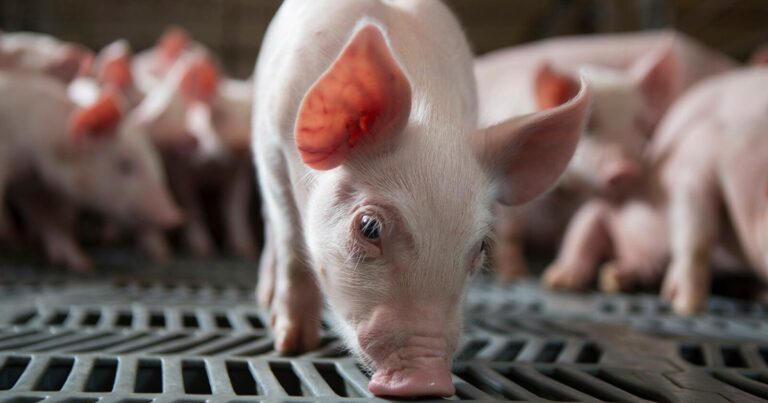By the University of Minnesota
The Minnesota Nutrition Conference 2023 and the Allen D. Leman Swine Conference are landmark events in the world of animal nutrition, swine health and management. This article provides an overview of the conference programs, highlighting key sessions and speakers focused on the theme of sustainability.
At the Minnesota Nutrition Conference, Lara Moody, from the American Feed Industry Association’s Institute for Feed Education and Research, kicked off the day with a talk on sustainability tools available to AFIA stakeholders. She spoke about the importance of sustainable practices in today’s world, emphasizing the need for conscientious approaches to animal feed formulation. Animal-based foods currently account for 11% of global greenhouse gas emissions and 12% of global water consumption, and are responsible for 65% of global land-use change. It is imperative that the feed industry advances sustainability efforts such as responsible sourcing of feed ingredients, regenerative agricultural practices, circular sourcing of ingredients, and the application of feed innovations that mitigate GHG emissions.
Therefore, iFEEDER has developed a roadmap to assist businesses in the sustainability planning process. This roadmap includes three main stages: analysis (leadership buy-in, return on investment and appropriate framework), walk (identification of needs, commitment, definition of objectives) and execution (communication, monitoring progress, supplier engagement). Some projects can merge business needs for reliable electricity supply with low environmental impact technologies (e.g. The Maschhoffs food mill).
Depending on the project, the animal nutrition company may choose to prepare feeding programs that mitigate the environmental footprint of diets. In this regard, the director of the Global Feed LCA Institute, Delanie Kellon, provided an overview of the methodology and scientific rigor of database development. The day ended with a presentation of David Dayhoff from DSM firmenich, who shared sustainability tools and experiences, encouraging participants to integrate sustainable practices into their work.
The 2023 Minnesota Nutrition Conference served as a platform for experts to share knowledge and discuss the latest developments in the field. From sustainability in the feed industry to the microbiome of various animal species, the conference program offered a comprehensive overview of nutrition science. Attendees left the event with a deeper understanding of nutrition challenges and opportunities, ready to make a positive impact on the industry and the world at large. As the field of nutrition continues to evolve, events like this play a pivotal role in promoting innovation and collaboration among nutrition professionals.
In addition to presentations on sustainable animal feeding programs, the Allen D. Leman Swine Conference is renowned for its commitment to advancing knowledge and innovation in the swine industry. At this year’s conference, three exceptional presentations took center stage, each providing valuable insights into the field of sustainability.
Erin Cortus of the University of Minnesota, with sponsorship from the National Pork Board, gave a groundbreaking presentation on “ManureDB: Accessing Past and Present Manure Nutrient Data in the United States.” » This presentation highlighted the importance of understanding the value of manure in sustainable agriculture. Erin presented ManureDB, an innovative tool that provides access to a wealth of historical and contemporary data regarding the nutrient content of manure in the United States. The public gained a deep appreciation of the potential of manure as a valuable resource, not just a waste product. Erin’s work has highlighted the importance of data-driven decision-making to optimize nutrient management and promote sustainable agricultural practices.
Anna Cates, also from the University of Minnesota, explored “Principles of Soil Health and Rotational Manure.” This presentation highlighted the essential role of soil health in pig farming. Anna explained how incorporating manure into crop rotation strategies can have a profound impact on soil fertility, structure and sustainability. By describing the synergistic relationship between manure and soil health, Anna provided participants with a plan for harnessing manure as a sustainable resource that benefits both the environment and crop yields. His presentation highlighted the importance of environmentally friendly agricultural practices in the pork industry.
In a collaborative effort, Christian Ramirez-Camba and Pedro E. Urriola of the University of Minnesota presented “Optimize amino acid intake to improve animal health while reducing the nitrogen footprint.“Their work focused on the delicate balance between animal nutrition and environmental responsibility. By optimizing amino acid intake, they demonstrated how animal health can be improved while simultaneously reducing the nitrogen footprint associated with production This presentation illustrates the overall conference theme of responsibility and sustainability in swine agriculture, offering valuable insights into the intersection of animal welfare and ecological management.
These presentations at the Allen D. Leman Pork Conference illustrate the event’s commitment to advancing knowledge and innovation in the swine industry. They showed the importance of data-driven decisions in manure nutrient management, highlighted the importance of soil health principles in crop rotation, and introduced innovative strategies to optimize acid supply amino acids to promote animal health and environmental sustainability. Together, these presentations illuminated the path towards more responsible and sustainable pork production, ensuring a better, more environmentally friendly future for the industry.
